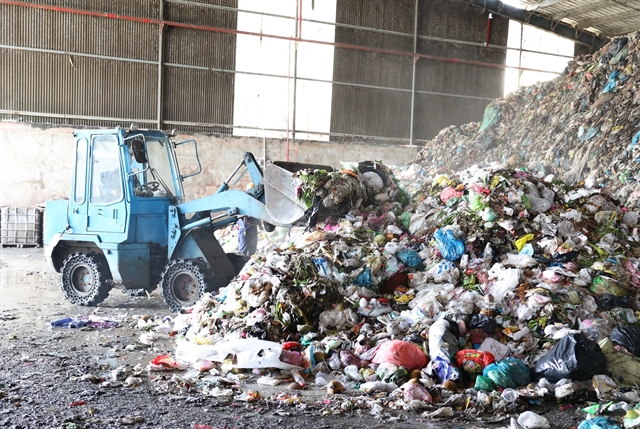.jpg) Environment
Environment

 |
| Garbage piles up at a waste treatment plant in Tây Ninh Province. — VNA/VNS Photo Thanh Tân |
Unsorted waste could be denied collection according to a draft document proposed by the Ministry of Natural Resources and Environment. Dr Vũ Thanh Ca, senior lecturer at Hanoi University of Natural Resources and Environment spoke to Voice of Vietnam (VOV) about the feasibility of this tentative policy and the necessary mechanisms for implementation.
What is the significance of the policy to deny collection of unsorted waste?
This is a necessary policy and one of the key regulations for waste classification in practice. Denying collection towards unsorted household waste will be a crucial decision.
This is because without waste sorting at the source, it is impossible to employ advanced waste classification technologies to ensure environmental sanitation and utilise garbage as a resource for a sustainable, circular economy related to waste.
Concerns have been raised about how this measure can lead to littering, or how feasible the policy is for apartment buildings that collect waste through trash chutes. What is your opinion on this matter?
It is necessary to monitor waste classification in households.
Unsorted waste can be returned to the source, along with a fine to compensate for the trash collectors’ effort in this process.
In some cases, we can publicise the violating households on their local neighbourhood’s bulletin board to increase the pressure and propel residents to sort out their household waste.
Apartment buildings each have a management board. They must advocate, mobilise and make decisions together with the residents.
If waste is not sorted before collection, it can be returned to the building’s management board.
Any person who does not follow waste sorting practices can affect the whole residential building and that will pressure the community into action.
What are the lessons learned from other countries in the world in regard to waste sorting at the source?
Most developed countries in the world have required waste classification at the source.
Japan employs a community-based approach, which means surveillance camera systems are put to use and public oversight is promoted.
If they find anyone who throws away garbage without sorting or not on schedule, they will return the trash bags at the door of the violating household.
Meanwhile, South Korea has strict regulations and hefty fines. Depending on the level of violations, the penalty can range from VNĐ4 million (US$160) to VNĐ20 million ($790).
Each country has their own specific policy on the issue, but all aim for sorting at the source, radical treatment of waste and making use of trash as a resource.
What are the necessary mechanisms to ensure that denying collection for unsorted waste will be a feasible policy?
A priority is to issue a detailed guideline on how to sort out waste at source. This information needs to be widely available so that everyone can have access to the knowledge.
There should also be advocacy campaigns to mobilise engagement from the public.
Another important thing is to employ a good infrastructure. It would be meaningless if waste is sorted out at the source and but then collected together.
Currently, we do not have customised vehicles to transport sorted waste. It is also necessary to have a schedule for specific waste collection.
We must also put in place strict regulations and develop pivotal laws for a thorough, comprehensive legal framework for implementation.
If we do not start right now and take stringent actions, it will be extremely difficult to achieve the desired results. — VNS




